Unit 5 What were you doing when the rainstorm came? Section A Grammar Focus课件(49张PPT)
文档属性
| 名称 | Unit 5 What were you doing when the rainstorm came? Section A Grammar Focus课件(49张PPT) | 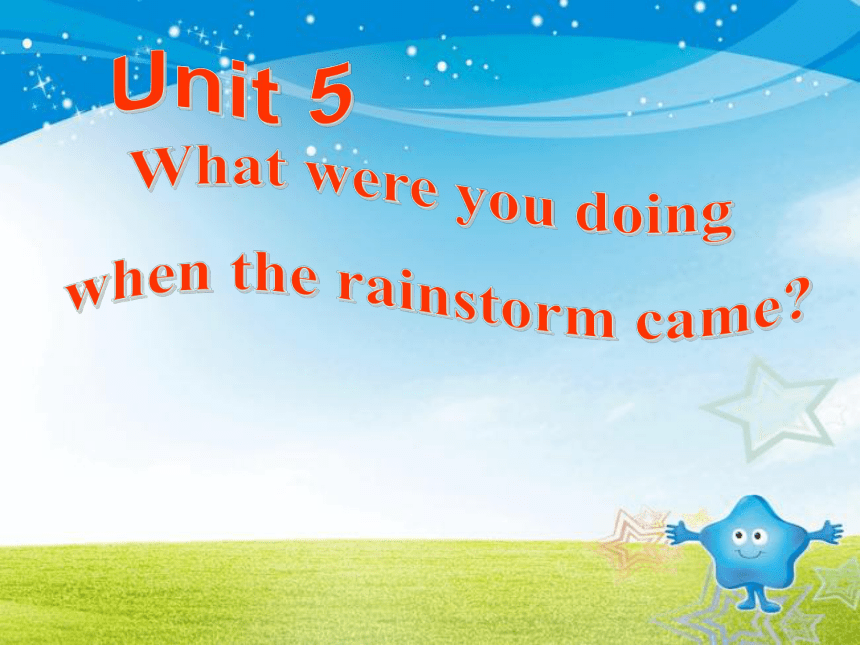 | |
| 格式 | zip | ||
| 文件大小 | 1.0MB | ||
| 资源类型 | 教案 | ||
| 版本资源 | 人教新目标(Go for it)版 | ||
| 科目 | 英语 | ||
| 更新时间 | 2019-06-17 07:34:48 | ||
图片预览

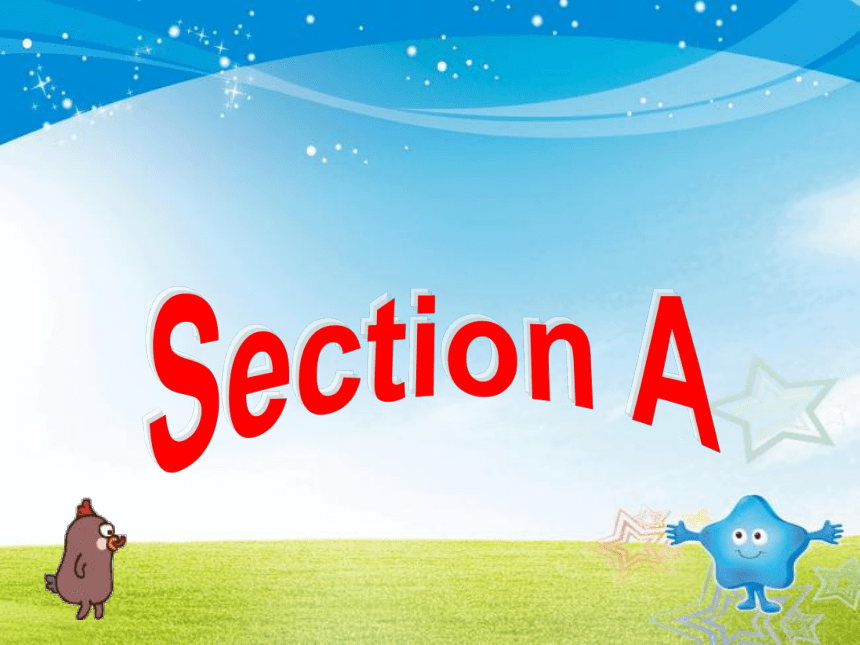
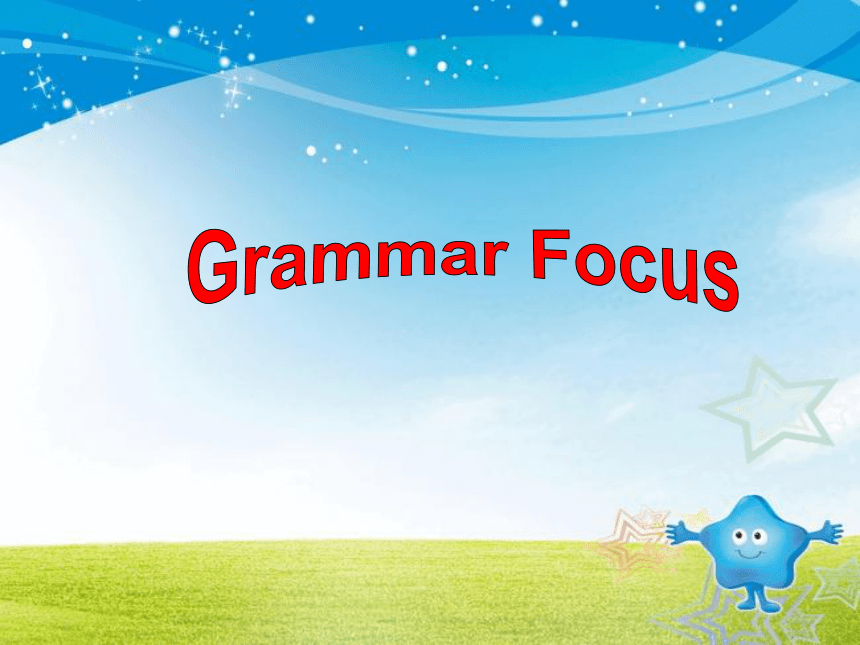
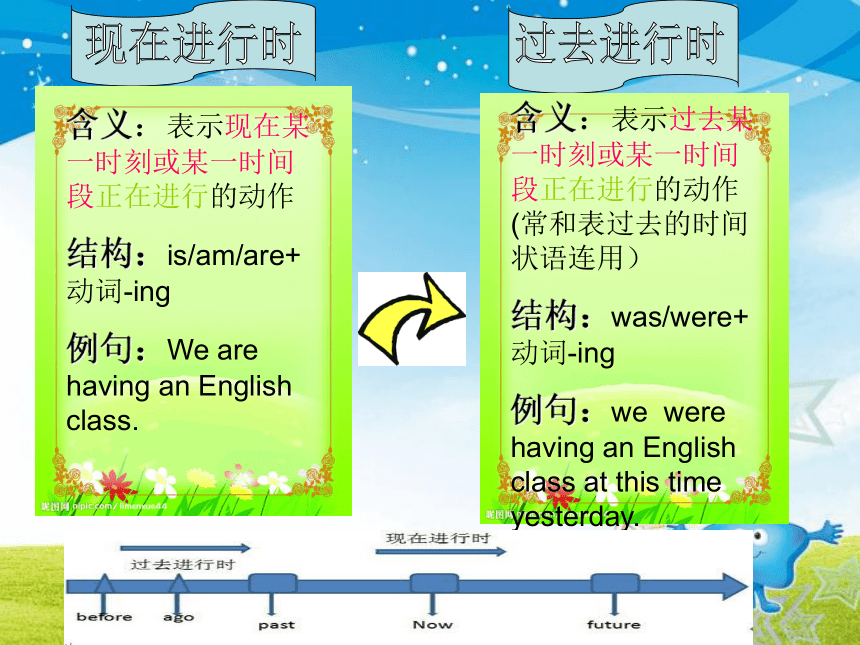
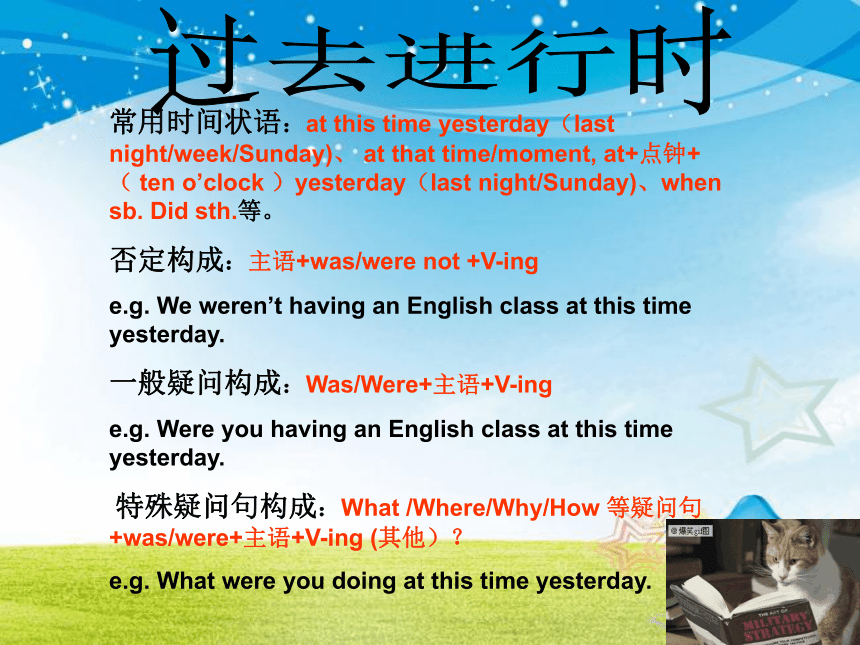
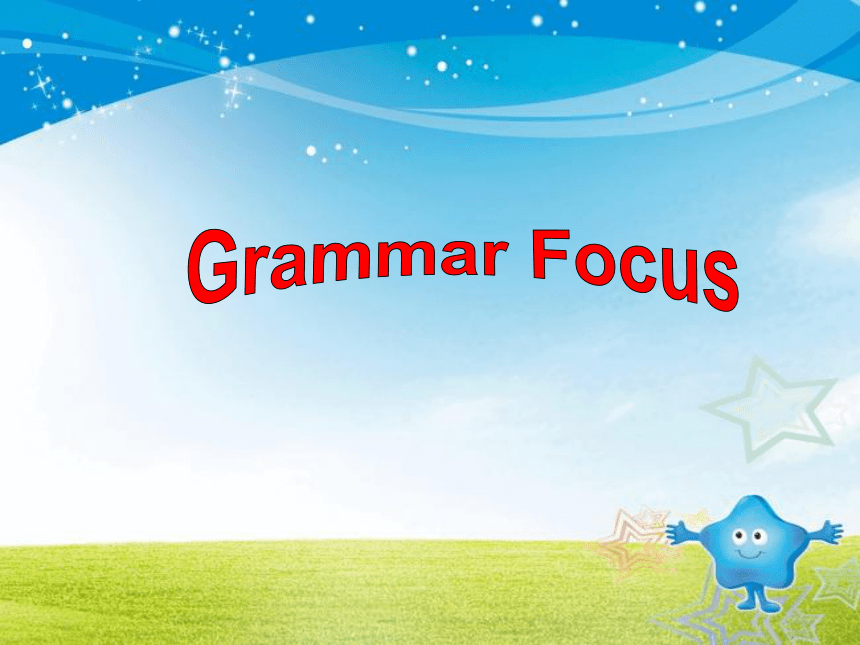
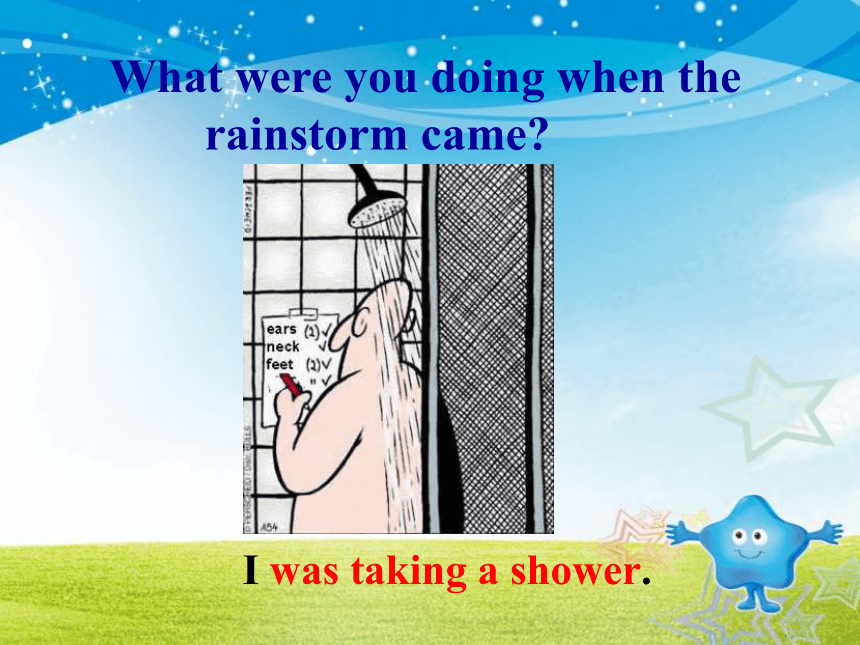

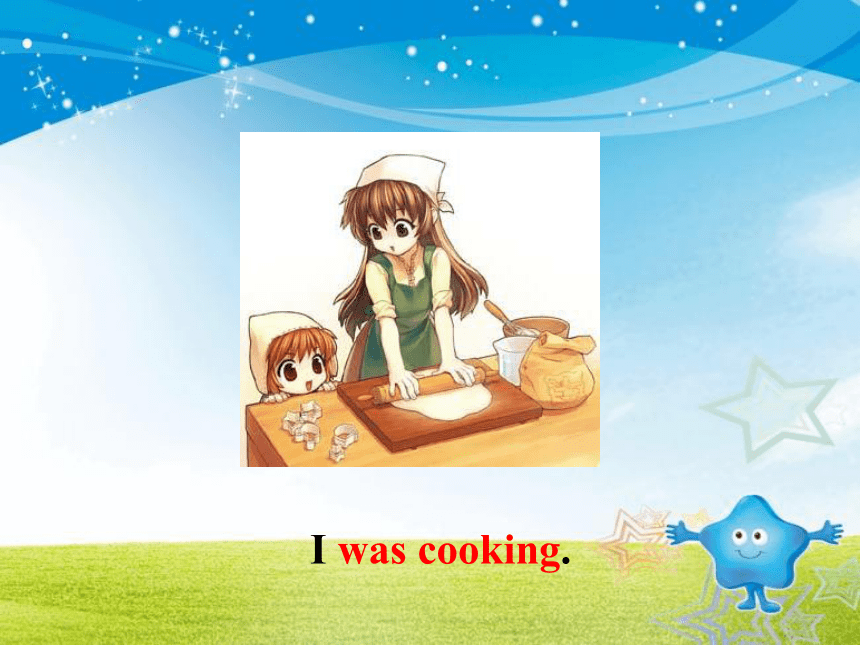

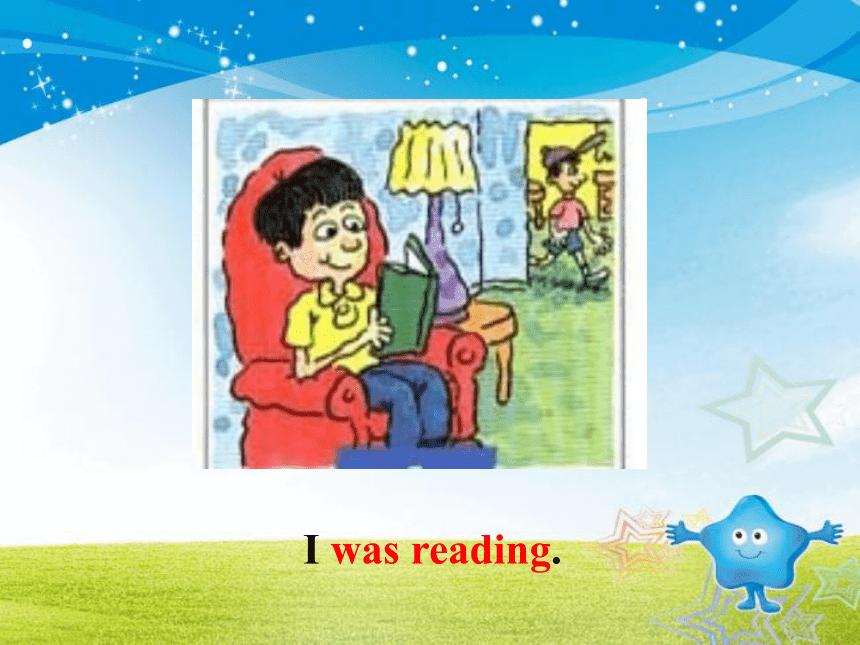
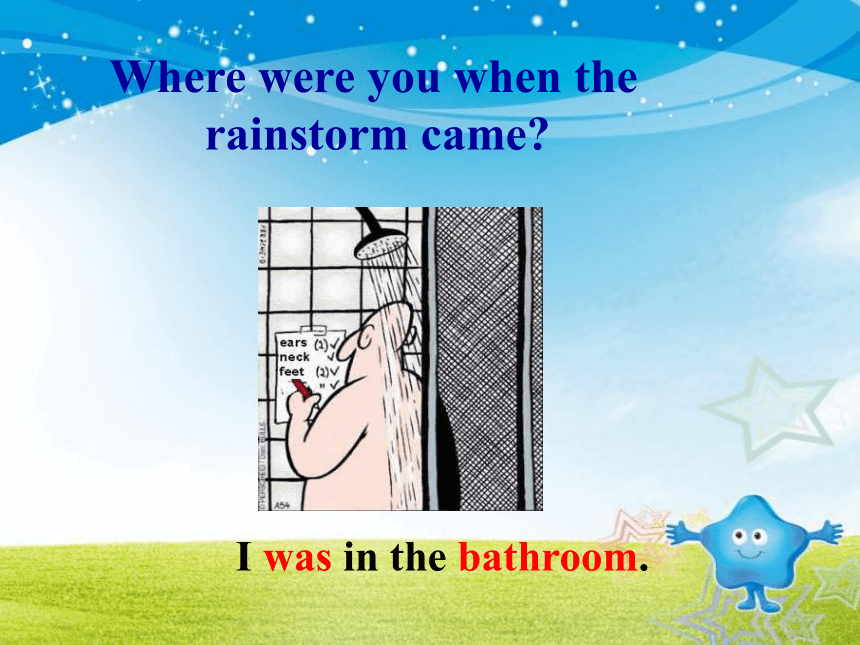
文档简介
课件49张PPT。What were you doing
when the rainstorm came?Unit 5Section A
Grammar Focus现在进行时过去进行时含义:表示现在某一时刻或某一时间段正在进行的动作
结构:is/am/are+动词-ing
例句:We are having an English class.含义:表示过去某一时刻或某一时间段正在进行的动作(常和表过去的时间状语连用)
结构:was/were+动词-ing
例句:we were having an English class at this time yesterday.过去进行时常用时间状语:at this time yesterday(last night/week/Sunday)、 at that time/moment, at+点钟+( ten o’clock )yesterday(last night/Sunday)、when sb. Did sth.等。
否定构成:主语+was/were not +V-ing
e.g. We weren’t having an English class at this time yesterday.
一般疑问构成:Was/Were+主语+V-ing
e.g. Were you having an English class at this time yesterday.
特殊疑问句构成:What /Where/Why/How 等疑问句+was/were+主语+V-ing (其他)?
e.g. What were you doing at this time yesterday. Grammar FocusWhat were you doing when the
rainstorm came?I was taking a shower.I was sleeping.I was cooking.I was cutting hair.I was reading.I was in the bathroom.Where were you when the
rainstorm came?I was in the bedroom.I was in the kitchen.I was in the barber’s chair.I was in the living-room.Grammar FocusWhat was he doing when the rainstorm came?
He was reading in the library when the rainstorm came.What was Ben doing when it began to rain heavily?
When it began to rain, Ben was helping his mom make dinner.What was Jenny doing while Linda was sleeping?
While Linda was sleeping, Jenny was helping Mary with her homework.?? 1. 以when和while引导的时间状语从句1) 延续性动词和非延续性动词
????延续性动词指动作可以延续一段时间, 而不是
瞬间结束。
????如: work、study、drink、eat等。
????非延续性动词指动作极为短暂,瞬间结束。
????如: start、begin、hit、jump、knock等。2) 在本单元中, 出现了以when和while引导的
时间状语从句。
when表示“当……的时候”。从句中既可用延续性
动词, 又可用非延续性动词, 这些动词既可以
表示动作, 又可表示状态。从句中的动作既可
和主句的动作同时发生, 又可在主句的动作之前
或之后发生。如:
????Mary was having dinner when I saw her .
????The boy was still sleeping when his mother got
home yesterday morning .while表示“在……的时候”、“在……期间”。
它强调主句的动作与从句的动作同时发生或
主句的动作发生在从句的动作过程中。While
从句中必须是表示动作或状态的延续性动词。如:
????The weather was fine while we were in Beijing .
????She called while I was out.
如果主句的动作在从句的动作过程中发生,
从句常用进行时。如:
While we were swimming someone stole our clothes .
Don’t talk so loud while others are working.?总结?1) when可指时间点, 又可指时间段, 从句中
可用延续性动词, 也可用非延续性动词。
?2) while总是指一个时间段, 从句中必须用延
续性动词。1. _______ Jennifer was reading a magazine,
his sister was listening to the pop music.
A. While B. When C. What time
2. I was trying to draw a cat on the board
_________ the teacher came in.
A. while B. when C. what time
3. My best friend visited my house while I
_______ dinner in the kitchen.
A. cooked B. cooking C. was cooking练一练A B C 4. ―?When?______ the car ______?
―?In 1885.?
(2007随州市)
A. did; invent????? ?B. was; invented
C. does; invent? D. is; invented
5. Our teacher wants us to be ______?when?we talk with the foreigners.
(06大连中考真题) A. comfortable???? B. unusual???????
?? C. grateful??????? ? D. confident B D 6. — Dick gave me a note?while?I ______ in the
library.? — I guess he made it to say “sorry” to you.
(2007黄冈市)? A. am reading B. was reading? ? ?
C. reads? ? D. will read?? B 2. 过去进行时1. 概念: 表示过去某一时刻或某段时间内正进行的动作。
2. 构成: was/were + 动词现在分词
3. 用法:
a: 表示某一时刻正进行的行为, 与特定的过去时间状
语连用,常见的时间有: at 8 last night, at this time
at that time, at that moment 等
e.g. What were you doing at 10 yesterday morning?
I was writing a letter to my father at that moment.b: 表示过去某段时间内正进行的动作。
e.g. We were building a house last winter.
They were waiting for you yesterday.
否定句和疑问句:
e.g. We were not sleeping at home.
Was he feeling well???3.现在分词的构成1) 一般动词在词尾加-ing, 如go--going。
2) 以不发音字母e结尾的动词, 先去掉e, 再加-ing。
come--coming???make--making?? write--writing
3) 以重读闭音节结尾的动词, 如果末尾以一个
辅音字母结尾, 应先双写这个字母, 再加ing,
x和w结尾的除外。
如: get--getting????swim--swimming?
show--showing??4) 以字母y结尾的单词, 直接加ing。
????如carrying、playing、studying。
5) 以字母ie结尾的动词, 变ie为y, 再加ing。
?? die → dying???????????? lie →lying
6) 以元音字母加e结尾, 或以e结尾, 且e发音的
动词, 直接加- ing。
??? see--seeing????????????be--being4.使用进行时态的注意事项1)一些动词, 如see、hear、love、like、know、
remember; understand、have等表示感情、
知觉和状态的词, 一般不用于进行时态。
2) 在there和here引起的句子中, 常用一般现在
时代替现在进行时。
e.g. Here comes the bus.
?????? There goes the bell.5. 过去进行时和一般过去时的区别1) 过去进行时表示过去正在进行的动作,
而一般过去时则表示一个完整的动作。如:
They were writing letters to their friends last night.
昨晚他们在写信给他们的朋友。
(没有说明信是否写完)
They wrote letters to their friends last night .
?他们昨晚写了信给他们的朋友。
(表达了他们已写好的意思, 整个写的过程已完成)2) 当动作延续较长时间时或表示厌烦、赞美等
感彩时, 常用过去进行时表示。如:
He was thinking more of others than of himself.
他考虑别人的比考虑自己的多。
(表示说话者赞扬的口气)
The boy was always making trouble then .
那时, 他总是惹麻烦。(表示说话者厌烦的口气)过去进行时含义: 表示过去某个时刻
正在进行的动作。
结构:
was/were + doing
例句:
I was having an English
class at this time yesterday. 现在进行时含义: 表示现在
正在进行的动作。
结构:
is/am/are + doing
例句:
I am having an English class. 6. 4a. Look at the table and write sentences
with both while and when.e.g.
While John was taking photos, Mary bought a drink.
John was taking photos when Mary bought a drink.While John was playing the piano, Mary left the house.
John was playing the piano when Mary left the house.While John was shopping, Mary took the car to the car wash.
John was shopping when took the car to the car wash.While John was cleaning his room, Mary turned on the radio.
John was cleaning his room when Mary turned on the radio.4c. What were you doing at these times last
Sunday? Fill in the chart. Then ask your
partner.
A: What were you doing at nine o’clock last
Sunday morning?
B: I was sleeping. How about you?
A: I was doing my homework.
B: You're kidding! Group work What were you doing at … last Sunday?A: What were you doing at nine o’clock
last Sunday?
B: I was running. How about you?
A: I was reading.
B: You’re kidding! v. 欺骗; 戏弄; 开玩笑Revision: when vs. while 这两个词都有“当…的时候”的意思。
when 既可指某一点时间, 也可以指一段时间;
while 强调一段时间, 所以从句的谓语动词常是延续性的。
当 when表示“在某一段时间里” 的意思时, 它可以代替
while, 但while不能代替when.
e.g. When I came home, she was cooking dinner.
当我到家时, 她正在做饭。
When you hang wet clothes near a fire, you will see
steam rising from them.
当你把湿衣服挂在火边时, 你会看到水汽从衣服上升起。单项选择1. I met a friend of mine _____ I was walking in
the park.
A. before B. when C. after D. if
2. We’ll go for a walk if it _____ tomorrow.
A. will not rain B. isn’t raining
C. doesn’t rain D. isn’t rain
3. I met Li Lei _____ hospital last Sunday.
He was ill _____ hospital then.
A. in the, in the B. in, in the C. in the, in D. in, inB C C 4. When you are _____ trouble, why not phone
the _____?
A. at, police B. in, policeman
C. in, police D. at, policeman
5. ____ useful invention the computer is!
A. What a B. What an C. How a D. How an
C A 6. I can’t find ____ to sit on the crowded bus.
A. nowhere B. somewhere
C. anywhere D. everywhere
7. My mother was cooking while I ____ the radio.
A. listened to B. have listened to
C. was listening to D. is listening to
8. _____ TV at that time?
A. Did you watch B. Have you watched
C. Were you watching D. Are you watchingC C C 9. They arrived ____ Paris ____ a winter evening.
A. at, in B. to, on C. in, on D. in, at
10. Mr. Green told us ____ too much time ____
reading novels.
A. don’t take; on B. not to take; in
C. not to spend; in D. don’t to spend; on
11. Do you know _____?
A. what he happened
B. what the matter is with him.
C. what happened to him
D. what did he happenedC C C 12. The thief _____ the purse and _____.
A. drops, run after B. dropped, ran away
C. dropped, run away D. dropped, ran away
13. People in China are always dressed ______
their best clothes _____ New Year’s Day.
A. at, in B. to, on C. in, on D. in, at
D C 14. —Is Mr. Green really very ill?
— __________ . He's?in?hospital.
(中考真题)
A I don' t think so B No, he isn't
C l hope so D I' m afraid so
15. Her husband is ill _____ (2006 北京市)
A.?in?a?hospital? B.?in?hospital?
C.?in?the?hospital? D. on?the?hospital D B 16. ―My pen is lost and I can’t find
it?anywhere. ―So you will have to buy _________. (中考真题)
A. it B. few C. one D. any C
when the rainstorm came?Unit 5Section A
Grammar Focus现在进行时过去进行时含义:表示现在某一时刻或某一时间段正在进行的动作
结构:is/am/are+动词-ing
例句:We are having an English class.含义:表示过去某一时刻或某一时间段正在进行的动作(常和表过去的时间状语连用)
结构:was/were+动词-ing
例句:we were having an English class at this time yesterday.过去进行时常用时间状语:at this time yesterday(last night/week/Sunday)、 at that time/moment, at+点钟+( ten o’clock )yesterday(last night/Sunday)、when sb. Did sth.等。
否定构成:主语+was/were not +V-ing
e.g. We weren’t having an English class at this time yesterday.
一般疑问构成:Was/Were+主语+V-ing
e.g. Were you having an English class at this time yesterday.
特殊疑问句构成:What /Where/Why/How 等疑问句+was/were+主语+V-ing (其他)?
e.g. What were you doing at this time yesterday. Grammar FocusWhat were you doing when the
rainstorm came?I was taking a shower.I was sleeping.I was cooking.I was cutting hair.I was reading.I was in the bathroom.Where were you when the
rainstorm came?I was in the bedroom.I was in the kitchen.I was in the barber’s chair.I was in the living-room.Grammar FocusWhat was he doing when the rainstorm came?
He was reading in the library when the rainstorm came.What was Ben doing when it began to rain heavily?
When it began to rain, Ben was helping his mom make dinner.What was Jenny doing while Linda was sleeping?
While Linda was sleeping, Jenny was helping Mary with her homework.?? 1. 以when和while引导的时间状语从句1) 延续性动词和非延续性动词
????延续性动词指动作可以延续一段时间, 而不是
瞬间结束。
????如: work、study、drink、eat等。
????非延续性动词指动作极为短暂,瞬间结束。
????如: start、begin、hit、jump、knock等。2) 在本单元中, 出现了以when和while引导的
时间状语从句。
when表示“当……的时候”。从句中既可用延续性
动词, 又可用非延续性动词, 这些动词既可以
表示动作, 又可表示状态。从句中的动作既可
和主句的动作同时发生, 又可在主句的动作之前
或之后发生。如:
????Mary was having dinner when I saw her .
????The boy was still sleeping when his mother got
home yesterday morning .while表示“在……的时候”、“在……期间”。
它强调主句的动作与从句的动作同时发生或
主句的动作发生在从句的动作过程中。While
从句中必须是表示动作或状态的延续性动词。如:
????The weather was fine while we were in Beijing .
????She called while I was out.
如果主句的动作在从句的动作过程中发生,
从句常用进行时。如:
While we were swimming someone stole our clothes .
Don’t talk so loud while others are working.?总结?1) when可指时间点, 又可指时间段, 从句中
可用延续性动词, 也可用非延续性动词。
?2) while总是指一个时间段, 从句中必须用延
续性动词。1. _______ Jennifer was reading a magazine,
his sister was listening to the pop music.
A. While B. When C. What time
2. I was trying to draw a cat on the board
_________ the teacher came in.
A. while B. when C. what time
3. My best friend visited my house while I
_______ dinner in the kitchen.
A. cooked B. cooking C. was cooking练一练A B C 4. ―?When?______ the car ______?
―?In 1885.?
(2007随州市)
A. did; invent????? ?B. was; invented
C. does; invent? D. is; invented
5. Our teacher wants us to be ______?when?we talk with the foreigners.
(06大连中考真题) A. comfortable???? B. unusual???????
?? C. grateful??????? ? D. confident B D 6. — Dick gave me a note?while?I ______ in the
library.? — I guess he made it to say “sorry” to you.
(2007黄冈市)? A. am reading B. was reading? ? ?
C. reads? ? D. will read?? B 2. 过去进行时1. 概念: 表示过去某一时刻或某段时间内正进行的动作。
2. 构成: was/were + 动词现在分词
3. 用法:
a: 表示某一时刻正进行的行为, 与特定的过去时间状
语连用,常见的时间有: at 8 last night, at this time
at that time, at that moment 等
e.g. What were you doing at 10 yesterday morning?
I was writing a letter to my father at that moment.b: 表示过去某段时间内正进行的动作。
e.g. We were building a house last winter.
They were waiting for you yesterday.
否定句和疑问句:
e.g. We were not sleeping at home.
Was he feeling well???3.现在分词的构成1) 一般动词在词尾加-ing, 如go--going。
2) 以不发音字母e结尾的动词, 先去掉e, 再加-ing。
come--coming???make--making?? write--writing
3) 以重读闭音节结尾的动词, 如果末尾以一个
辅音字母结尾, 应先双写这个字母, 再加ing,
x和w结尾的除外。
如: get--getting????swim--swimming?
show--showing??4) 以字母y结尾的单词, 直接加ing。
????如carrying、playing、studying。
5) 以字母ie结尾的动词, 变ie为y, 再加ing。
?? die → dying???????????? lie →lying
6) 以元音字母加e结尾, 或以e结尾, 且e发音的
动词, 直接加- ing。
??? see--seeing????????????be--being4.使用进行时态的注意事项1)一些动词, 如see、hear、love、like、know、
remember; understand、have等表示感情、
知觉和状态的词, 一般不用于进行时态。
2) 在there和here引起的句子中, 常用一般现在
时代替现在进行时。
e.g. Here comes the bus.
?????? There goes the bell.5. 过去进行时和一般过去时的区别1) 过去进行时表示过去正在进行的动作,
而一般过去时则表示一个完整的动作。如:
They were writing letters to their friends last night.
昨晚他们在写信给他们的朋友。
(没有说明信是否写完)
They wrote letters to their friends last night .
?他们昨晚写了信给他们的朋友。
(表达了他们已写好的意思, 整个写的过程已完成)2) 当动作延续较长时间时或表示厌烦、赞美等
感彩时, 常用过去进行时表示。如:
He was thinking more of others than of himself.
他考虑别人的比考虑自己的多。
(表示说话者赞扬的口气)
The boy was always making trouble then .
那时, 他总是惹麻烦。(表示说话者厌烦的口气)过去进行时含义: 表示过去某个时刻
正在进行的动作。
结构:
was/were + doing
例句:
I was having an English
class at this time yesterday. 现在进行时含义: 表示现在
正在进行的动作。
结构:
is/am/are + doing
例句:
I am having an English class. 6. 4a. Look at the table and write sentences
with both while and when.e.g.
While John was taking photos, Mary bought a drink.
John was taking photos when Mary bought a drink.While John was playing the piano, Mary left the house.
John was playing the piano when Mary left the house.While John was shopping, Mary took the car to the car wash.
John was shopping when took the car to the car wash.While John was cleaning his room, Mary turned on the radio.
John was cleaning his room when Mary turned on the radio.4c. What were you doing at these times last
Sunday? Fill in the chart. Then ask your
partner.
A: What were you doing at nine o’clock last
Sunday morning?
B: I was sleeping. How about you?
A: I was doing my homework.
B: You're kidding! Group work What were you doing at … last Sunday?A: What were you doing at nine o’clock
last Sunday?
B: I was running. How about you?
A: I was reading.
B: You’re kidding! v. 欺骗; 戏弄; 开玩笑Revision: when vs. while 这两个词都有“当…的时候”的意思。
when 既可指某一点时间, 也可以指一段时间;
while 强调一段时间, 所以从句的谓语动词常是延续性的。
当 when表示“在某一段时间里” 的意思时, 它可以代替
while, 但while不能代替when.
e.g. When I came home, she was cooking dinner.
当我到家时, 她正在做饭。
When you hang wet clothes near a fire, you will see
steam rising from them.
当你把湿衣服挂在火边时, 你会看到水汽从衣服上升起。单项选择1. I met a friend of mine _____ I was walking in
the park.
A. before B. when C. after D. if
2. We’ll go for a walk if it _____ tomorrow.
A. will not rain B. isn’t raining
C. doesn’t rain D. isn’t rain
3. I met Li Lei _____ hospital last Sunday.
He was ill _____ hospital then.
A. in the, in the B. in, in the C. in the, in D. in, inB C C 4. When you are _____ trouble, why not phone
the _____?
A. at, police B. in, policeman
C. in, police D. at, policeman
5. ____ useful invention the computer is!
A. What a B. What an C. How a D. How an
C A 6. I can’t find ____ to sit on the crowded bus.
A. nowhere B. somewhere
C. anywhere D. everywhere
7. My mother was cooking while I ____ the radio.
A. listened to B. have listened to
C. was listening to D. is listening to
8. _____ TV at that time?
A. Did you watch B. Have you watched
C. Were you watching D. Are you watchingC C C 9. They arrived ____ Paris ____ a winter evening.
A. at, in B. to, on C. in, on D. in, at
10. Mr. Green told us ____ too much time ____
reading novels.
A. don’t take; on B. not to take; in
C. not to spend; in D. don’t to spend; on
11. Do you know _____?
A. what he happened
B. what the matter is with him.
C. what happened to him
D. what did he happenedC C C 12. The thief _____ the purse and _____.
A. drops, run after B. dropped, ran away
C. dropped, run away D. dropped, ran away
13. People in China are always dressed ______
their best clothes _____ New Year’s Day.
A. at, in B. to, on C. in, on D. in, at
D C 14. —Is Mr. Green really very ill?
— __________ . He's?in?hospital.
(中考真题)
A I don' t think so B No, he isn't
C l hope so D I' m afraid so
15. Her husband is ill _____ (2006 北京市)
A.?in?a?hospital? B.?in?hospital?
C.?in?the?hospital? D. on?the?hospital D B 16. ―My pen is lost and I can’t find
it?anywhere. ―So you will have to buy _________. (中考真题)
A. it B. few C. one D. any C
同课章节目录
- Unit 1 What's the matter?
- Section A
- Section B
- Unit 2 I'll help to clean up the city parks.
- Section A
- Section B
- Unit 3 Could you please clean your room?
- Section A
- Section B
- Unit 4 Why don't you talk to your parents?
- Section A
- Section B
- Unit 5 What were you doing when the rainstorm came
- Section A
- Section B
- Review of Units 1-5
- Unit 6 An old man tried to move the mountains.
- Section A
- Section B
- Unit 7 What's the highest mountain in the world?
- Section A
- Section B
- Unit 8 Have you read Treasure Island yet?
- Section A
- Section B
- Unit 9 Have you ever been to a museum?
- Section A
- Section B
- Unit 10 I've had this bike for three years.
- Section A
- Section B
